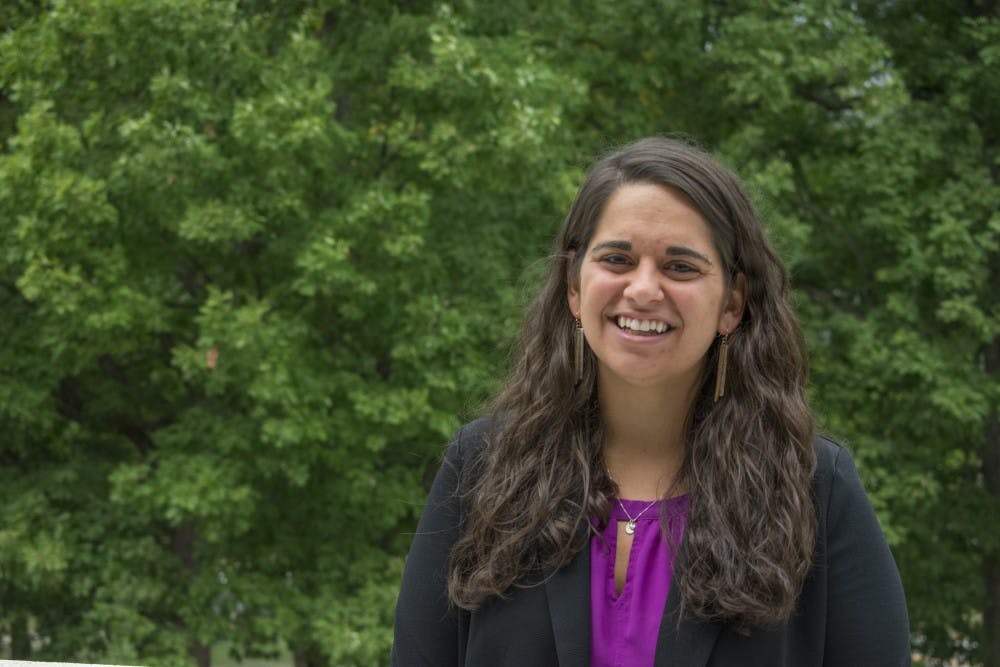Editor's Note: This article is the second in a series exploring mental health and its resources on University of Richmond's campus. The series will continue to be published throughout the fall semester. Click here to read previous articles.
Dr. Rachel Turk’s cozy office looks more like a hangout than a workspace. Against the wall sits a plush couch surrounded by comfortable lounge chairs, while warm, rich colors of homey decor seem almost iridescent in the glowing light of her table lamps. The serene ambiance paired with Turk’s approachable smile and bubbly personality create a welcoming environment where students can feel at ease.
University of Richmond’s first-ever sports psychologist hopes students and student-athletes alike will find her an accessible and amicable resource for personal struggles with mental health issues.
Turk earned her bachelor’s degree in psychology from Lynchburg College in 2013 and went on to earn her master’s degree in clinical-counseling psychology from Radford University in 2015, according to the UR Athletics website.
She completed her pre-doctoral psychology internship at Appalachian State University with the Counseling and Psychological Services Center, where she specialized in working with trauma survivors, student-athletes and the issue of eating concerns. She earned her Doctor of Psychology from Radford University in August.
Turk played women’s volleyball at her alma mater, Lynchburg College, but her interest in the relation between athletics and mental health began in middle school.
“Eating concerns were my first introduction into the combination of mental health and athletics,” Turk said. “Back playing volleyball, it was rare to be on a team that didn’t have somebody who was struggling with an eating concern.”
Mental health is an issue that affects 33% of all college students. Among this group, 30% of students seek help, but only 10% of college-athletes affected by mental health problems seek help, Daniel Eisenberg, associate professor at the University of Michigan School of Public Health, told USA Today.
Student-athletes struggle with mental health issues at the same rate as members of the general student body, but these athletes seek services at a much lower rate, Turk said.
“It’s often perceived as a weakness,” she said, “And being weak is the exact opposite of what most athletes are aiming for.”
Athletes hear that they should be tough, she said.
“I think athletics and mental health aren’t talked about as much because athletes are trained their entire lives to have a ‘toughen-up’ mentality,” Turk said. “They’re given these messages from coaches or trainers to push through and have some grit. This mindset doesn’t lend itself to athletes thinking it’s okay to get help if they’re struggling with something.”
Enjoy what you're reading?
Signup for our newsletter
Turk hopes to instill in student-athletes the idea that seeking help does not show weakness but instead shows strength.
“Knowing what you need and being willing to ask for it is actually going to put you in a much better position than sucking it up and pushing through it,” she said.
UR football wide receiver and junior Dan Jaques said being a student-athlete intensified the normal stressors college students face every day.
“Our morning practices have me wake up at 5:45 a.m., then I feel tired and sometimes moody for the rest of the day,” Jaques said. “Sometimes it feels like I have no time for myself. All these pressures are on top of the obvious pressure of wanting to perform your very best. With so much invested in the sport, it's hard when things don't go your way.”
Turk said that with student-athletes, typical mental health issues that the average college student endured — such as anxiety, depression, relationship issues and academic pressure — were magnified because of the high demands of college athletics, whether that be pressure to perform or the burden of maintaining a scholarship.
Lori Taylor, the women’s track director and head women’s cross country and track and field coach, said that Turk’s help would be a valuable resource for student-athletes and their well-being.
“I think with this position it creates more of an accessible and available resource to help with whatever it is among our student-athletes, whether that is an injury, or anxiety about school or their performance,” Taylor said. “The goal is providing them with easily accessible resources and tools to navigate them being the best student and athlete they can be.”
Contact contributor Jordan Daniel at jordan.daniel@richmond.edu.
Support independent student media
You can make a tax-deductible donation by clicking the button below, which takes you to our secure PayPal account. The page is set up to receive contributions in whatever amount you designate. We look forward to using the money we raise to further our mission of providing honest and accurate information to students, faculty, staff, alumni and others in the general public.
Donate Now



